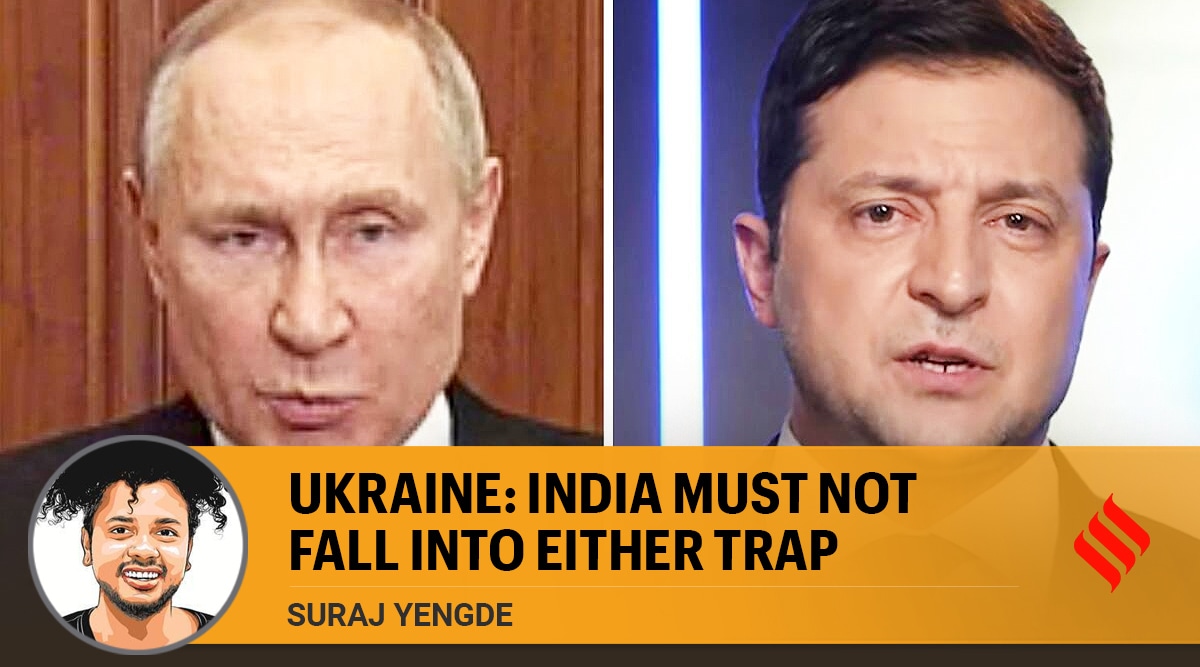 Russian President Vladimir Putin (left) and Ukrainian President Volodymyr Zelenskyy. (Photos: AP)
Russian President Vladimir Putin (left) and Ukrainian President Volodymyr Zelenskyy. (Photos: AP) The Russia-Ukraine war is possibly one of the most discussed in the domain of recent wars. Forget the Afghanistan war of six decades, the Somalian war of four decades, the war in the Middle East of three decades. Forget the part where American-backed Saudis are erasing Yemen from the map, the Palestinian extermination happening for the past 70 years, the invasions of Iraq and Syria, and the sanctions on Cuba, Iran, Venezuela, Bolivia, as part of a mandate for international peace pronounced by leaders of the world.
We must assess the Russia-Ukraine conflict against this backdrop. First, a primer to Ukraine. It is contested whether Ukraine was crafted into a modern nation state by Lenin or Ukraine’s star historian Mykhailo Hrushevsky. Vladimir Putin assumes that the nation state of Ukraine was a creation of Lenin through the Bolsheviks. However, the Ukrainians object to such patronising reading of history. Nevertheless, one fact remains, that the confederation of Ukraine was part of the Soviet Union.
The conflict has to do with remnants of the Cold War tussle for supremacy. Ukraine is being used by both the Western bloc and Russia to establish their influence. These war games are merely a snapshot of how the Northern Hemisphere thinks of its individual problems as world problems. The nations of Africa, Asia and Latin America earlier parted ways from this thirst of white people for a dominant position.
The Non-Aligned Movement and the Organisation of Solidarity with the Peoples of Asia, Africa and Latin America charted a solidarity away from the white-imposed world order.
This time it is the breaking away of a former Soviet bloc nation that is hurting the Russian nationalists. Ukraine is the largest of the former Soviet countries.
It is also an independent sovereign nation with full membership of the United Nations. It has diverse population groups, among them those who swear by Russia. And they voted to make Jewish Volodymyr Zelensky the president of the country.
Russia’s anxiety stems from NATO breaking its assurance to not move eastwards in February 1990. Since then, it has added 10 nations that are either neighbours or at arm’s length from Russia, even as it has gone about setting up bases and missiles.
Russia’s annexation of Crimea and then other territories was a clarion call for Ukraine to decide its future. Russia wanted Ukraine to maintain neutrality in the face of NATO aggression.
The former colonial powers of western Europe and newly joined white nations which are the size and strength of Indian districts want to play the role of supervisor of international affairs. There is still nostalgia for the colonial-subject relationship. It is evident in the racist treatment meted out to those of black and brown nationalities seeking to flee conflict zones in Ukraine, by countries that are NATO allies.
One cannot deny that Ukraine ranks among the top iron, magnesium, and other mineral producers in the world. It sits on important energy resources, of immense value to any power that controls it.
There is an admitted paranoia about the nuclear threat. So if at all the war is about taking sides, our side should be towards reconciliation and a non-nuclear world.
By abstaining at the UN, India has done what it has always maintained as the cornerstone of its foreign policy. It is continuing its legacy of not falling into the trap of either zone. Russia might be popular not because of the oligarchic proclivities of Putin, but because it offers a strong counter to the imperialism of America.
The Dalit community of the world should also start contributing its bit to world debates and global happenings. They should act as equals. With a massive 300-million-plus population, it is incumbent upon them to actively seek politics of the global.
(Suraj Yengde, the author of Caste Matters, curates the fortnightly ‘Dalitality’ column)
- The Indian Express website has been rated GREEN for its credibility and trustworthiness by Newsguard, a global service that rates news sources for their journalistic standards.

